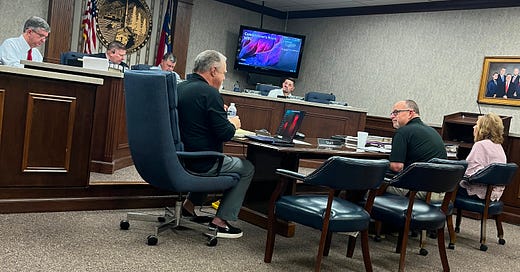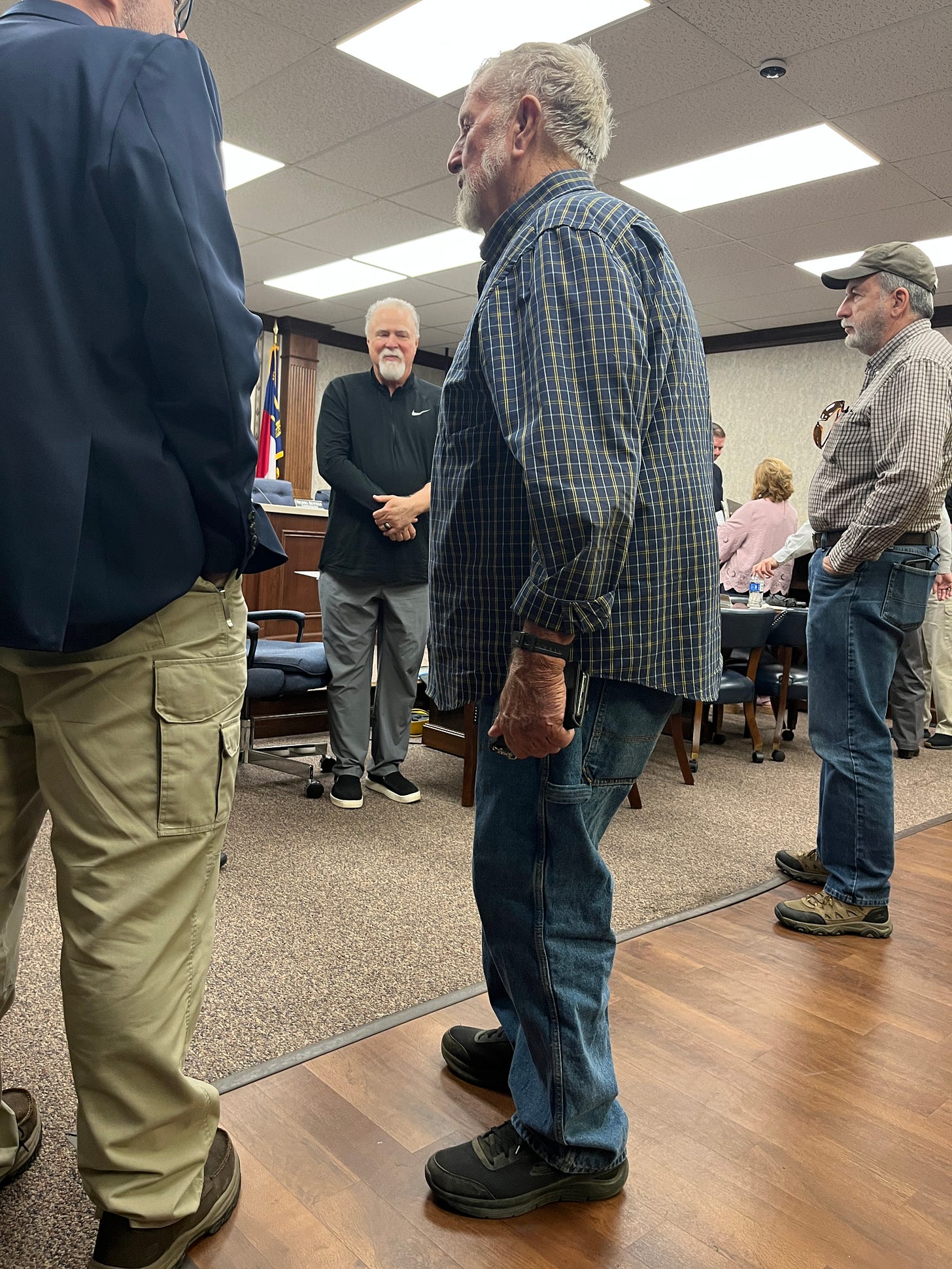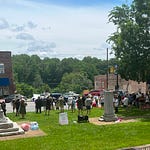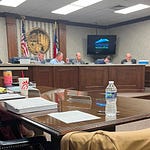Producing high-quality, in-depth news takes significant resources. At Lake Lure News / Cops & Congress, facts come first, followed by in-depth commentary and analysis. Your subscription helps support independent journalism that brings you closer to the decisions shaping the community and ensures I can continue delivering the stories that matter most.
Situational awareness: An exclusive, or scoop is an important news story that is first reported by a journalist. This goes beyond breaking news when no other journalists are known to be reporting on an important issue.
RUTHERFORDTON, N.C. — Rutherford County Commissioners met Tuesday evening for a critical budget workshop focused on the proposed 2025–2026 fiscal plan. (Watch my livestream above, which I first reported on my Facebook page, and you may also access the county’s version on their website.) While no votes were taken, the consensus was loud and clear from commissioners: no new taxes. Below are the top 10 takeaways from the meeting:
1. Unanimous Opposition to Tax Increases
Commissioners across the board rejected the idea of raising property taxes. Several cited feedback from constituents and the ongoing burden of recovery from recent hurricanes and economic pressures.
2. Emergency Services, Schools, and Sheriff’s Office Named Top Priorities
Commissioners emphasized finding ways to fund core public safety services without increasing taxes, including EMS, schools, and the sheriff’s office.
3. Staff Instructed to Draft a “Plan B” Budget
County staff were asked to revise the budget to eliminate the proposed tax hike while still meeting essential needs.
4. Sales Tax Revenue Trending Down
Sales tax collections are declining, according to staff, due to the end of pandemic-era federal stimulus and inflation-driven economic shifts. The county is projecting minimal growth, if any, compared to the usual 2–3% annual increase.
5. Forest City Tax Hike Impacting County Revenue
Due to recent tax increases by Forest City, up to $2 million annually that once went to the county is now redirected to the town, affecting the county’s available resources, according to county officials.
6. Fire Departments Requesting Tax Rate Increases
Although the Board doesn’t govern local fire departments, they do set their tax rates. Several departments requested increases, but commissioners asked for better justification and more detailed financial documentation.
7. Cliffside Sanitary District Faces Financial Struggles
Now back under local control after years of state oversight, the Cliffside Sanitary District is operating with a $54,000 shortfall. Commissioners acknowledged the need for support, particularly given the working-class demographic of the district.
8. Deferred Reimbursements from FEMA and Federal Sources
The county is still waiting on millions in reimbursements from past disasters. Staff noted that delays of several years are not uncommon, making budgeting unpredictable.
9. Pay Raises for Public Employees Under Scrutiny
While some municipalities like Forest City are considering 11% raises, the county is still evaluating how to stay competitive in retaining EMS and sheriff’s staff without overspending.
10. Infrastructure and Facility Needs on the Horizon
The county faces upcoming costs for a new sheriff’s office, evidence storage facilities, and completing the detention center—projects that will strain reserves without outside support.
What Are the Newest Commissioners Doing During Their First Budget Season?
Chairman Bryan King, Vice Chairman Alan Toney, and Commissioner Michael Benfield are seasoned hands when it comes to budget season, but all eyes are on how newcomers Donnie Haulk and Hunter Haynes are navigating their first round of fiscal decision-making.
Commissioner Haulk has quickly distinguished himself, not just by opposing tax increases, but by stepping into a role the county has long neglected. In the absence of a public information officer or communications director, Haulk launched a video series interviewing department heads about their budget needs. It's a rare act of transparency in local government—and one that’s left many asking: why wasn’t this done before? His DIY approach is helping the public understand exactly how departments are spending—and requesting—their tax dollars.
Commissioner Haynes, meanwhile, is keeping his sights on law enforcement funding. During the May 13 workshop, he emphasized the need to support the Rutherford County Sheriff’s Office without burdening taxpayers. But after the meeting, Haynes didn’t mince words online. “What we should be upset about is the taxpayer dollars wasted to hold this ‘workshop,’” he said on Facebook. “No work done whatsoever in my opinion.” Haynes, a narcotics detective, brings a front-line perspective to the board—and a direct style that reflects the frustration many residents feel.
The County Manager, Steve Garrison, and county staff are now preparing a revised budget with no tax increase, as requested by the board. Commissioners will reconvene on May 27 to continue deliberations ahead of a public hearing and final vote in June.
Opinion & Analysis: Cops & Congress Commentary
Do we need a RuCo DOGE (Rutherford County Department of Government Efficiency)?
At Tuesday’s budget workshop, I found myself once again wrestling with an old nemesis: the oversized artificial plant obstructing the electrical outlet and side view of the meeting room—a recurring barrier between the public and transparency. It recently appeared, put in a location where I had sat for months on the side of the room. But now there’s a new twist. To charge my phone while live streaming the meeting, I had to remove a child safety plug from the wall outlet. It’s a curious addition—are there toddlers crawling around the Rutherford County Office Building that I’ve somehow missed? I’ve never seen one. It raises a larger question that extends far beyond fake greenery and outlet covers: What else is the county spending money on that serves no real public purpose? When budgets are tight and the public is being asked to do more with less, even the smallest signs of misplaced spending deserve scrutiny.
The Room Was Packed, the Signs Were Clear: No New Taxes
At Tuesday’s Rutherford County budget workshop, it wasn’t just the commissioners who showed up ready to talk money—it was the people. The room was packed, dominated by conservative voters and Republican activists holding up “NO TAX INCREASE” signs. (All Commissioners are Republicans.) Their message was crystal clear: they’re watching, they’re organized, and they’re not footing the bill for a bloated budget.

Let’s be honest—taxes impact all of us. From the cost of groceries to the value of our homes, a county tax increase has ripple effects across every working family and business in Rutherford County. Which raises a question taxpayers deserve an answer to: Why did the county manager propose a budget that was so untenable from the start?
The original proposal included more spending than the current revenue could support, despite a cooling economy, reduced sales tax revenue, and a public already strapped from hurricane recovery and rising living costs. If you’ve lived through inflation or filed a claim after a storm, you know there isn’t much wiggle room in most household budgets. So why would the government think it had more?
Three things to watch ahead of the next budget workshop on May 27:
1. Will Department Heads Justify Their “Wish Lists”?
Some departments reportedly requested 40%+ increases over last year’s budget. Commissioners called out these outliers, signaling a reckoning ahead. Taxpayers should look closely at who’s asking for more—and why.
2. Will Emergency Services Be Protected Without Raising Taxes?
There’s a broad consensus that EMS, school safety, and the sheriff’s office need support, but there’s no agreement yet on how to fund that without new taxes. Creative solutions and cuts elsewhere will be necessary. Citizens should listen closely: which services get protected and which get downsized?
3. Can the County Afford to Wait on FEMA?
The county is still waiting for millions in federal reimbursement for disaster recovery. Commissioners acknowledged that money could be years away. Will leaders gamble on that funding, or start scaling back spending now?
The bottom line is this: budgets are moral documents. They reflect not just what the government can afford, but what it should prioritize. The public made their priorities clear. Now it’s time to see if the county can match that clarity with courage.
Want to be heard? The next workshop is open to the public on May 27 at 5:00 p.m. It’s your money. Make sure they know it. Email Commissioners and feel free to cc me. There are no public comments accepted at workshops under local and state guidelines. Public comments are accepted at regular county commissioners’ meetings, the next is scheduled for June 2.
Thank you for reading and watching. Learn more about this newsletter and my background. I am guided by the Society for Professional Journalists’ Code of Ethics. Follow me on X (Twitter), Facebook, Linkedin, TikTok, and YouTube. Send constructive criticism, fan mail and tips with public documents for future stories: CopsandCongress@gmail.com.















Share this post